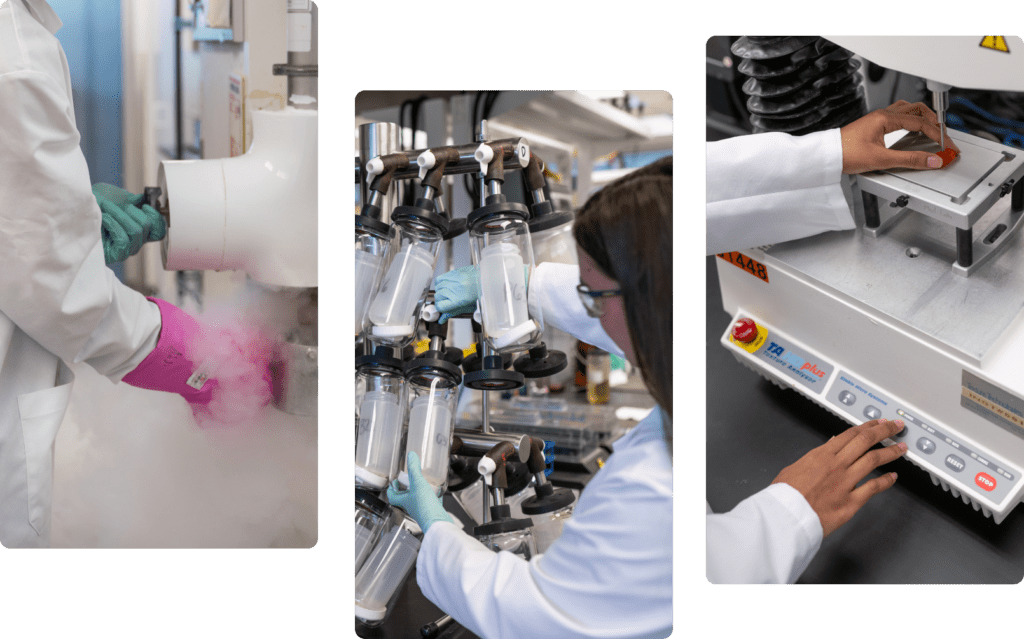PDCAAS - Invitro (Protein Quality) Test
-
Price
$1675 per analysis
-
Turnaround time
12 - 15 Business Days
-
Rush
Available


Technical data sheet
Method description
Initially, a sample is measured for the Amino Acid composition using method AOAC 994.12. A human digestion simulation follows, breaking down the proteins into amino acids, which are reacted with Ninhydrin and measured; determining the digestibility. Taking the limiting amino acid value the digestibility is corrected resulting in a Protein Digestibility Corrected Amino Acid Score (PDCAAS).
Acceptable matrices
Foods and food ingredients
Limit of quantitation
PDCAAS values range from 0 - 1
Equipment
Incubator, Spectrophotometer, pH Meter
Method reference
Internally Developed Method
Sample size requirements
50 g
Information required by submitter
Please supply estimates
Additional information
The following values are reported:
- Full amino acid profile
- First limiting amino acid
- Sample moisture
- Total protein (both by AAA and combustion nitrogen)
- Animal safe digestibility
- Amino acid score
Common PDCAAS - Invitro (Protein Quality) Test Testing Questions
Initially, a sample is measured for the Amino Acid composition using method AOAC 994.12. A human digestion simulation follows, breaking down the proteins into amino acids, which are reacted with Ninhydrin and measured; determining the digestibility. Taking the limiting amino acid value, the digestibility is corrected, resulting in a Protein Digestibility Corrected Amino Acid Score (PDCAAS).
Protein quality: A measure of a dietary protein’s usefulness for tissue growth and maintenance.
A complete protein is that which has a limiting amino acid score of 1. It would have adequate portions of the nine essential amino acids.
The In-vitro PDCAAS method is recommended for research and product development use. At this time, it is recommended to use the in-vivo PDCAAS (rat digestion) for final product labeling.
The in-vivo PDCAAS is the most used as that is what the FDA states for labeling purposes.
While our sales and customer service team are happy to answer general testing questions, consultations typically start at a rate of $250 per 30 minutes regarding the interpretation of reported test results or questions about our test methods. We cannot consult on regulations, tolerance limits, or claims.
We make every effort to keep our methods and detection limits up to date according to the latest standards and qualifications. If you have any questions regarding the limit of detection/quantification or method references, please contact our Customer Service team at 1-800-245-5615.
Our standard turnaround time is 10 business days for most assays. There are some assays that require a longer turnaround time. We also offer a RUSH service that is half the time of the standard turnaround time of the assay at double the cost of the assay. A few assays that we provide cannot be rushed due to the nature of the test. Please check the specific assay you are interested in regarding the ability to RUSH the turnaround time.
Medallion Labs, a division of General Mills, offers multiple areas of expertise for analytical testing and product evaluation for the food and ingredient industry. Our areas of expertise include Chemical Analysis, Nutritional Analysis, Food Safety, Shelf Life Studies, Microbiology, Specialty Fibers, Physical Testing, Allergen Testing, as well as Product Evaluation (which includes Product Performance and Sensory Evaluation) and Technical Consulting/Method Development. Our methods are developed for the testing of food products and ingredients.
The in-vivo PDCAAS is the most used as that is what the FDA states for labeling purposes.
Do you have a more specific question?
Our food testing experts are here to help.
"*" indicates required fields

Helpful content related to PDCAAS - Invitro (Protein Quality) Test
Let’s Get to Work!
Submit your order online and ship your samples today. If you have questions, we are always here to help.
Medallion Labs
A food testing program designed with mid-market and enterprise food and ingredient manufacturers in mind.
